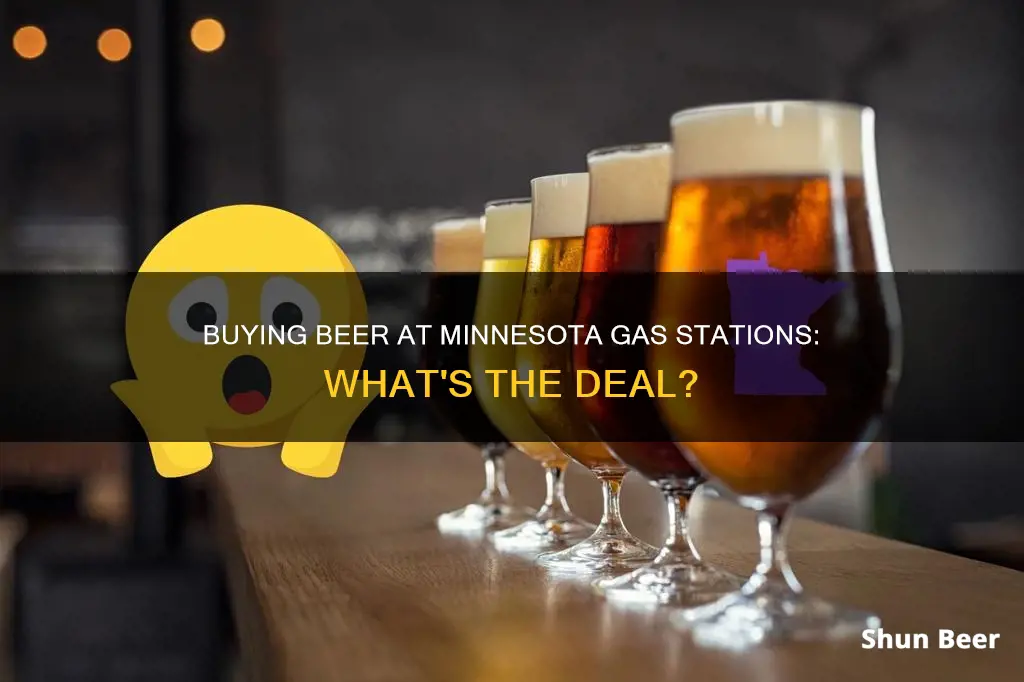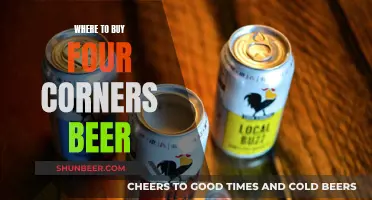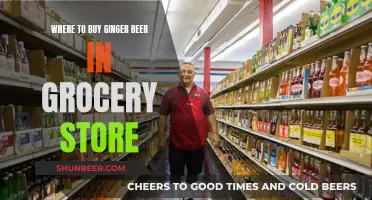
Minnesota is one of the few remaining states in the U.S. with tight restrictions on alcohol sales in grocery stores and gas stations. While liquor stores have been allowed to sell beer on Sundays since 2017, grocery stores and gas stations are prohibited from selling full-strength beer and wine. Instead, they can only sell beer with an alcohol content of 3.2% or lower, which is unique to Minnesota. This restriction has led to a decline in the market for 3.2 beer, with few brewers still producing it and consumers opting for higher-strength alternatives. Despite efforts to change the state's liquor laws, Minnesota's restrictive alcohol sales regulations remain in place, impacting small businesses and consumers who desire greater convenience and choice.
| Characteristics | Values |
|---|---|
| Can you buy beer at a gas station in Minnesota? | Yes, but only beer with 3.2% alcohol by weight or 4% alcohol by volume. |
| Beer with higher alcohol content | Can only be bought at liquor stores. |
| Liquor stores | Must close by 10 pm. |
| Liquor stores | Can be open on Sundays, but with restricted hours. |
| Grocery stores | Can sell beer with 3.2% alcohol by weight or 4% alcohol by volume. |
| Grocery stores | Can apply for liquor store licenses and many do. |
What You'll Learn

Minnesota's liquor laws are outdated and inconvenient
This law is particularly inconvenient for those living in rural areas, where the nearest liquor store may be some distance away. It also negatively impacts small business owners, who are unable to sell the products their customers want and are therefore losing out on potential revenue.
The law regarding the sale of liquor in grocery stores is especially archaic. While grocery stores can apply for liquor licenses, they are limited to having only one store per local jurisdiction, and the store must be separate from the main grocery store. This means that consumers cannot purchase liquor, wine, or full-strength beer along with their groceries and must make a separate trip to a dedicated liquor store.
In addition, Minnesota is the last state that has laws mandating the sale of 3.2 beer. This type of beer has a lower alcohol content and is unique to Minnesota. However, there is a declining market for 3.2 beer, as consumers prefer regular-strength beer, and fewer brewers are producing it.
The state's liquor laws are a holdover from the prohibition era and are no longer aligned with the expectations and needs of Minnesotans. Efforts to modernise these laws have been met with resistance from lawmakers, who cite the need to protect small liquor stores and distributors and maintain the "peace in the valley". However, by not updating these outdated laws, lawmakers are actively preventing small businesses from growing and adapting to the changing demands of their customers.
It is time for Minnesota to join the majority of states that allow the sale of full-strength beer and wine in grocery and convenience stores. Doing so would provide convenience and choice for consumers and support the growth of small businesses, particularly in rural areas.
Best Places to Buy 1919 Root Beer
You may want to see also

Archaic 3.2 beer laws in Minnesota
Minnesota is the only state in the US that still only allows 3.2 beer sales in gas stations and convenience stores. This law is a remnant of the Prohibition era, and it is causing issues for small businesses. The market for 3.2 beer is rapidly declining, and consumers are pushing for more choice and convenience.
The 3.2 beer law in Minnesota states that gas stations and convenience stores can only sell beer that is 3.2% alcohol by volume, which is lower than regular beer. This law is unique to Minnesota and is causing issues for both consumers and business owners. The demand for 3.2 beer has decreased over the years, with fewer consumers purchasing it and fewer brewers producing it. This has resulted in a limited variety of product options and a dwindling supply.
Business owners, especially those owning small convenience stores, are urging the state legislature to remove the 3.2 beer law and allow them to offer full-strength beer. They argue that they are well-positioned to sell beer as they already have the necessary training and infrastructure in place for age-restricted sales. Additionally, they want to support local craft breweries and provide their customers with more choices.
On the other hand, owners of liquor stores worry that changing the 3.2 beer law will hurt their businesses. Liquor stores in Minnesota have to compete with the convenience of one-stop shopping that grocery and convenience stores would offer if they were allowed to sell full-strength beer.
The debate over the 3.2 beer law in Minnesota highlights the tension between different segments of the alcohol business, including liquor stores, craft brewers, and convenience stores. While some argue for more freedom and convenience, others worry about the potential impact on their businesses and communities.
The 3.2 beer law in Minnesota is an archaic remnant of the Prohibition era that no longer aligns with the demands of consumers or business owners. With a declining market and limited options, the law is causing frustration and inconvenience for many. It remains to be seen whether the state legislature will remove or modify the law to better suit the needs of modern consumers and businesses.
Good Beer in Disney World: A Myth or Reality?
You may want to see also

Liquor stores in Minnesota have restricted hours
Minnesota's liquor laws are quite restrictive compared to other states, and they vary by county. Liquor stores in Minnesota have restricted hours and are not allowed to be open past 10 pm from Monday to Saturday and 6 pm on Sundays. On Thanksgiving Day and Christmas Day, liquor sales are banned, and sales are prohibited after 8 pm on Christmas Eve. These hours can differ by county, however. For example, in Olmsted County, liquor stores can be open until 9 pm during the week, while in Hennepin County, they were previously only open until 8 pm during the week and 10 pm on Fridays and Saturdays.
The restricted hours for liquor stores in Minnesota are a result of the state's prohibition-era liquor laws, which have been slowly modernising. For example, it was only in 2017 that the state allowed liquor sales on Sundays. Before that, some stores opted to remain closed on Sundays, and this still affects some stores today.
The state's liquor laws also vary depending on the type of alcohol. For instance, beer with less than 3.2% alcohol can be sold at grocery stores and gas stations, while wine and distilled spirits are only sold at municipal liquor stores. On-premise alcohol is available seven days a week from 8 am to 2 am at restaurants, bars, clubs, and hotels.
Where to Buy Double Diamond Beer Today?
You may want to see also

Minnesota's liquor laws are hurting small businesses
As a result, small business owners are prohibited from selling the regular beer and wine their customers want. They are only allowed to sell 3.2% beer, but the market for these products is rapidly declining, and few brewers are producing them anymore. When Minnesota finally allowed Sunday liquor sales in 2017, people no longer had a reason to buy 3.2% beer.
Modernizing liquor laws would help small businesses stay competitive and continue to serve their communities while giving craft breweries and local wineries the ability to sell their products in more ways. It would also lower prices and improve convenience for consumers.
However, there could be some adverse impacts. Removing state restrictions on competition in the liquor industry may increase alcohol abuse and could jeopardize the existence of municipal liquor stores. Allowing grocery stores to sell wine, in particular, would likely have a relatively modest economic and social impact, saving consumers only about $15 million annually.
The Best Places to Buy Authentic American Beer
You may want to see also

Minnesota's liquor laws are restrictive compared to neighbouring states
Minnesota's liquor laws are restrictive compared to its neighbouring states. The state prohibits most grocery, convenience, drug, and general merchandise stores from selling strong beer, wine, and spirits for off-premises consumption. Beer with less than 3.2% alcohol can be sold at grocery stores; wine and distilled spirits are only sold at municipal liquor stores. Bars, restaurants, and clubs can serve alcohol every day from 8 AM to 2 AM.
In contrast, at least three-fourths of the states allow strong beer to be sold in grocery, convenience, and drug stores, and about two-thirds of the states allow wine to be sold in these types of stores. One-third of the states also permit spirits to be sold in grocery and convenience stores.
The only alcohol that can be purchased at gas stations in Minnesota is "near-beer" or beer with up to 3.2% ABV. However, Minnesotans are hoping that this law will change soon.
Minnesota's liquor laws have been criticised for negatively impacting small businesses. The owner of 36 Lyn Refuel Station, a convenience store in South Minneapolis, has expressed frustration with the state's liquor laws, which prohibit gas stations and convenience stores from selling full-strength beer and wine. This restriction limits the products they can offer their customers and affects their competitiveness.
Additionally, Minnesota's liquor laws result in higher prices for beer and wine compared to neighbouring states like Wisconsin. A report by the Minnesota Legislature's Office of the Legislative Auditor found that off-sale prices for beer and wine were 7% to 9% higher in Minnesota than in Wisconsin due to the state's restrictive retail laws. However, the report also noted that prices for distilled spirits were lower in Minnesota due to the state's prohibition on exclusive territories for spirits distribution, which encourages competition among wholesalers.
Overall, Minnesota's restrictive liquor laws make it less convenient and more expensive for consumers to purchase alcoholic beverages compared to neighbouring states.
Buying Beer on Easter Sunday: Texas Laws Explained
You may want to see also
Frequently asked questions
Yes, but only beer with 3.2% alcohol by weight (ABW) or 4% alcohol by volume (ABV).
No, you can't buy wine at a gas station in Minnesota.
No, grocery stores can only sell beer with 3.2% alcohol by weight (ABW) or 4% alcohol by volume (ABV).
No, you can't buy liquor at a gas station in Minnesota.
No, you can't buy liquor at a grocery store in Minnesota.







